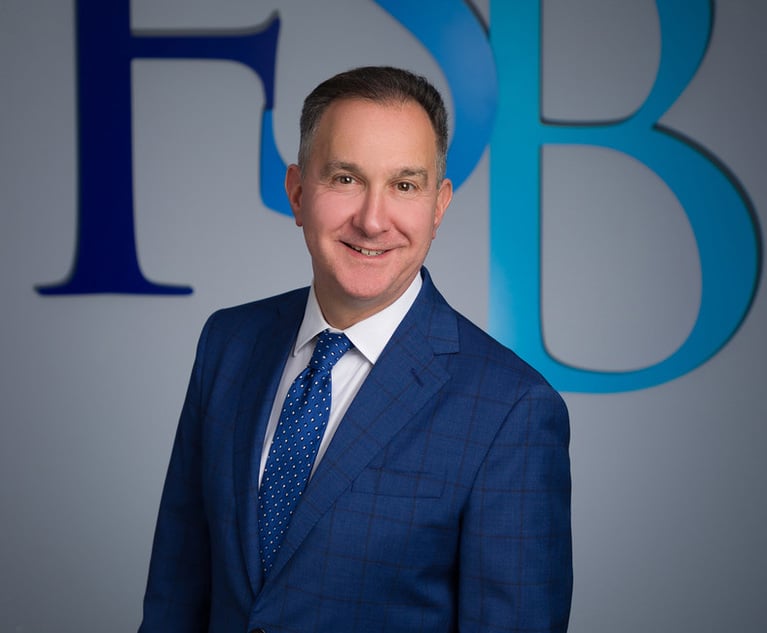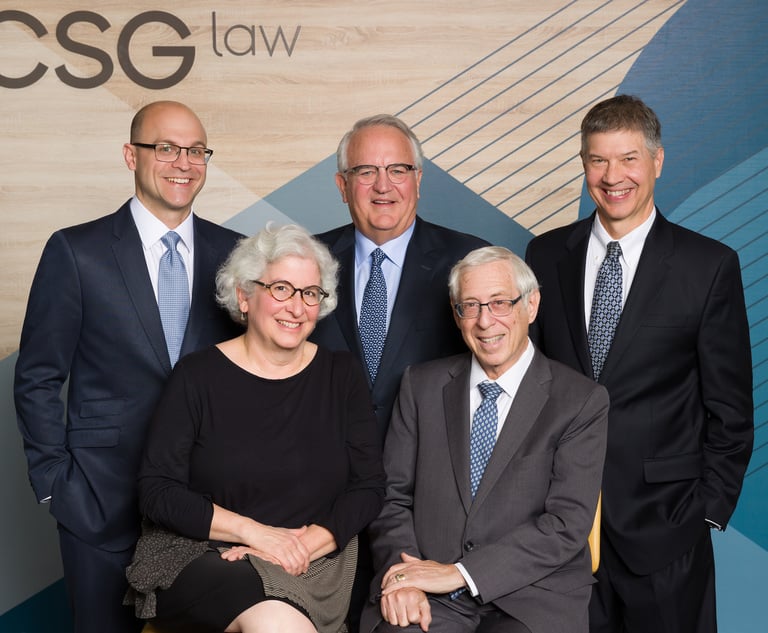Two Nemeses Square Off in Legal Mal Suit Over Reversed $166M Child Abuse Verdict
The grandmother of a New Jersey infant who was permanently disabled as a result of child abuse, and whose $166 million verdict against the state was reversed, is now suing their former attorney and his firm for legal malpractice.
November 27, 2017 at 06:06 PM
5 minute read
 Pictured from left David Mazie and Bruce Nagel.
Pictured from left David Mazie and Bruce Nagel.
The grandmother of a New Jersey infant who was permanently disabled as a result of child abuse, and whose $166 million verdict against the state was reversed, is now suing their former attorney and his firm for legal malpractice.
The lawsuit was filed Nov. 22 in Essex County Superior Court by the child's grandmother, Noemi Escobar, against David Mazie and his firm, Roseland's Mazie Slater Katz & Freeman.
Escobar is now represented by Mazie's former partner, Bruce Nagel. The two lawyers have a history of more than a decade of acrimony, dating back to when Mazie split with Nagel to form his own firm. Mazie Slater was formed in 2006, when Mazie led a defection from Nagel, Rice & Mazie, taking a number of cases with him that led to disputes over counsel fees. Both Mazie's firm and Nagel's—Nagel Rice—share office space in Roseland but the two lawyers do not speak to or acknowledge each other in public.
The Escobar lawsuit alleges that Mazie rejected numerous—and lucrative—offers from the state to settle the underlying lawsuit and that Mazie improperly included office expenses in his retainer agreement with Escobar.
In October, the state Supreme Court announced it wouldn't consider reinstating the $166 million verdict against the state in the case of the youth, Jadiel Velesquez, who was severely abused by his father after child welfare authorities declined to remove him from the home.
At the age of 4, Velesquez was left blind and cognitively disabled after his father violently shook him to stop him from crying.
The verdict, believed to have been the largest ever against the state, was later reduced to $102 million by a trial judge before being overturned last June by a state appeals court.
Escobar, who filed the injury suit, claimed the Division of Youth and Family Services—now called the Division of Child Protection and Permanency—was negligent for failing to remove the infant from his parents.
The jury verdict was delivered in December 2013, after a two-week trial and about two hours' deliberation. Essex County Superior Court Judge James Rothschild Jr. subsequently refused to vacate the award but granted the state's motion for remittitur. He reduced the damages for future medical expenses and assigned some fault to the father, against whom the jury apportioned zero liability at trial. The judge reduced the $105 million award for future medical care to $75.9 million. He then assigned 25 percent of the fault to the father, dropping the total recovery to $102 million. He left untouched awards of $57.7 million for pain and suffering, $1.9 million for a relative's caretaking services and $1.4 million for future lost wages.
On the state's appeal, Appellate Division Judges Jose Fuentes, Ellen Koblitz and John Kennedy said that, under agency rules, the DYFS lacked a basis to remove the infant, given what was known at the time the abuse incident took place. The panel said the two DYFS employee defendants in the case were entitled to statutory and qualified immunity because their actions in the case were reasonable. And based on the immunity of the individual defendants, the appeals court declined to hold DYFS or the state liable under a respondent superior theory of liability.
The panel cited Delbridge v. Schaeffer, a 1989 Law Division ruling finding DYFS caseworkers not liable in a case where a father was accused of sexual abuse of his 4-year-old daughter. Delbridge spoke of a “catastrophic” chilling effect on child abuse investigators if the defendants in that case were found liable.
“Here, the devastating physical injuries … were caused by the criminal conduct of his biological father, not by a division caseworker's good faith efforts to carry out his statutory responsibilities,” Fuentes wrote for the Escobar panel.
Mazie flatly rejected the allegations in the malpractice lawsuit, saying he and lawyers at his firm repeatedly advised Escobar to accept the state's settlement offers and that the retainer agreement was upheld by more than one judge.
Nagel, however, said Mazie's account with regard to the settlement offers was not true.
Mazie also said he believes the filing of the malpractice lawsuit was motivated in part by the bad blood between him and Nagel.
“He's just obsessed with us,” Mazie said. “He won't let it go,” he added, referring to the 2006 split up. “It's just unfortunate that [Escobar] is collateral damage to all of this.”
But Nagel insisted that Escobar sought him out.
“There are only a handful of lawyers who handle legal malpractice cases like this,” he said.
In September, the state dismissed claims, filed by Nagel, of ethics violations against Mazie stemming from an unrelated lawsuit.
According to a transcript of the June hearing at which the ethics case was dismissed, District Ethics Committee panel chairman Jay Lubetkin said of the relationship between Nagel and Mazie: “Context for the purposes of this decision … involves considering the long history of animosity between the grievant and the respondent. And among the public descriptions of the nature of that animosity, published by judges, are the following. That it's not just animosity, it's hall of fame animosity worthy of Cooperstown. It's extreme hostility between warring attorneys' respective new firms.”
This content has been archived. It is available through our partners, LexisNexis® and Bloomberg Law.
To view this content, please continue to their sites.
Not a Lexis Subscriber?
Subscribe Now
Not a Bloomberg Law Subscriber?
Subscribe Now
NOT FOR REPRINT
© 2024 ALM Global, LLC, All Rights Reserved. Request academic re-use from www.copyright.com. All other uses, submit a request to [email protected]. For more information visit Asset & Logo Licensing.
You Might Like
View All
Hit by Mail Truck: Man Agrees to $1.85M Settlement for Spinal Injuries

Appellate Div. Follows Fed Reasoning on Recusal for Legislator-Turned-Judge
4 minute read
Chiesa Shahinian Bolsters Corporate Practice With 5 From Newark Boutique
5 minute read
On the Move and After Hours: Brach Eichler; Cooper Levenson; Marshall Dennehey; Archer; Sills Cummis
7 minute readTrending Stories
Who Got The Work
Michael G. Bongiorno, Andrew Scott Dulberg and Elizabeth E. Driscoll from Wilmer Cutler Pickering Hale and Dorr have stepped in to represent Symbotic Inc., an A.I.-enabled technology platform that focuses on increasing supply chain efficiency, and other defendants in a pending shareholder derivative lawsuit. The case, filed Oct. 2 in Massachusetts District Court by the Brown Law Firm on behalf of Stephen Austen, accuses certain officers and directors of misleading investors in regard to Symbotic's potential for margin growth by failing to disclose that the company was not equipped to timely deploy its systems or manage expenses through project delays. The case, assigned to U.S. District Judge Nathaniel M. Gorton, is 1:24-cv-12522, Austen v. Cohen et al.
Who Got The Work
Edmund Polubinski and Marie Killmond of Davis Polk & Wardwell have entered appearances for data platform software development company MongoDB and other defendants in a pending shareholder derivative lawsuit. The action, filed Oct. 7 in New York Southern District Court by the Brown Law Firm, accuses the company's directors and/or officers of falsely expressing confidence in the company’s restructuring of its sales incentive plan and downplaying the severity of decreases in its upfront commitments. The case is 1:24-cv-07594, Roy v. Ittycheria et al.
Who Got The Work
Amy O. Bruchs and Kurt F. Ellison of Michael Best & Friedrich have entered appearances for Epic Systems Corp. in a pending employment discrimination lawsuit. The suit was filed Sept. 7 in Wisconsin Western District Court by Levine Eisberner LLC and Siri & Glimstad on behalf of a project manager who claims that he was wrongfully terminated after applying for a religious exemption to the defendant's COVID-19 vaccine mandate. The case, assigned to U.S. Magistrate Judge Anita Marie Boor, is 3:24-cv-00630, Secker, Nathan v. Epic Systems Corporation.
Who Got The Work
David X. Sullivan, Thomas J. Finn and Gregory A. Hall from McCarter & English have entered appearances for Sunrun Installation Services in a pending civil rights lawsuit. The complaint was filed Sept. 4 in Connecticut District Court by attorney Robert M. Berke on behalf of former employee George Edward Steins, who was arrested and charged with employing an unregistered home improvement salesperson. The complaint alleges that had Sunrun informed the Connecticut Department of Consumer Protection that the plaintiff's employment had ended in 2017 and that he no longer held Sunrun's home improvement contractor license, he would not have been hit with charges, which were dismissed in May 2024. The case, assigned to U.S. District Judge Jeffrey A. Meyer, is 3:24-cv-01423, Steins v. Sunrun, Inc. et al.
Who Got The Work
Greenberg Traurig shareholder Joshua L. Raskin has entered an appearance for boohoo.com UK Ltd. in a pending patent infringement lawsuit. The suit, filed Sept. 3 in Texas Eastern District Court by Rozier Hardt McDonough on behalf of Alto Dynamics, asserts five patents related to an online shopping platform. The case, assigned to U.S. District Judge Rodney Gilstrap, is 2:24-cv-00719, Alto Dynamics, LLC v. boohoo.com UK Limited.
Featured Firms
Law Offices of Gary Martin Hays & Associates, P.C.
(470) 294-1674
Law Offices of Mark E. Salomone
(857) 444-6468
Smith & Hassler
(713) 739-1250






